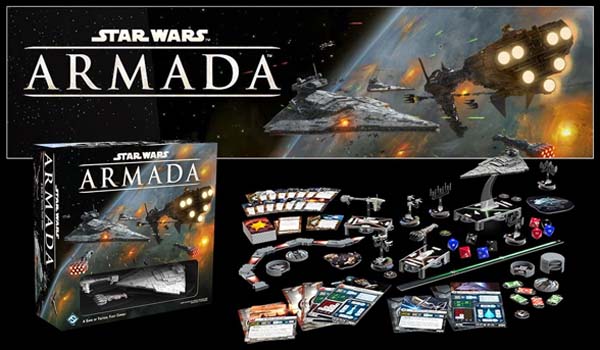
If you like the Star Wars: X-Wing miniatures game (and I do like it), or if you're eagerly awaiting the release of the second edition, but you don't want to house-rule that your car can act as a makeshift Star Destroyer, then Fantasy Flight has you covered. Star Wars: Armada is a higher-scale, tactical combat game using capital ships, and it might actually be a considerably better game than the core X-Wing set (at least better than the first edition)!
Planning ahead
Much like the board game Sails of Glory (which I also really like), Armada requires you to plan the actions of your capital ships a couple turns in advance. However, unlike Sails of Glory, it isn't the movement of these ships that you must pre-plan; it's their desired "commands". I was a little disappointed that the capital ships don't require that players plan their movement in advance, but then again, the maneuverability of these ships is highly limited, and only gets lower as the ship goes faster (if the ship in question even can go faster). There is a sense of inertia to these behemoth ships, but not quite the same level of inertia as the sailing ships of Sails of Glory.
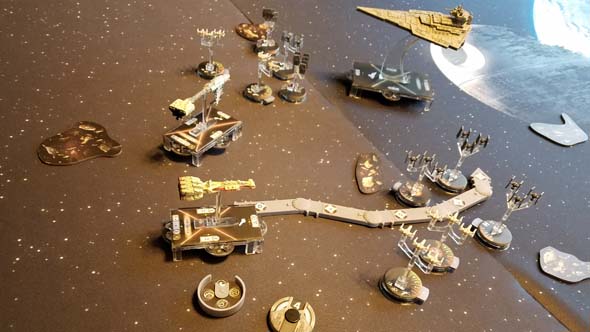
Ships move very slowly and have very limited maneuverability.
I do like that these ships both begin and end their movement relative to the font of their base. This alleviates the problems that X-Wing had with its large ships counter-intuitively moving faster than their smaller counterparts. And since the base Armada package comes with ships of varying sizes, this improvement is immediately noticeable without needing to wait for expansions: all ships move and turn at consistent speeds.
The rules do require that ships attack prior to moving. This means that you must plan ahead a little bit, since you have to position yourself for an attack in the turn prior, and have to anticipate who will have initiative and where their ship(s) will be if they get to move them before you get to make your attack.
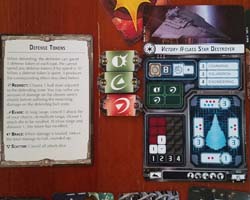
Defense tokens give players
more meaningful decisions.
More meaningful decisions
Even defense is a tactical decision! And this might be the single, best change from X-Wing. Instead of simply rolling defense dice to cancel out your opponent's attack rolls, you get to chose a set of defense tokens to apply, and each one mitigates damage in different ways. One defense token may allow you to cancel out an opponent's die roll, while another will allow you to redirect the damage to another hull section's shields, and yet another halves the total damage dealt. These tokens refresh each round, unless you use twice in the same round, in which case, it is permanently discarded.
This alleviates another of the problems that permeated X-Wing: that damaging an opponent often felt like playing craps. Getting into perfect position and lining up a point-blank shot against an opponent can be completely foiled by dice rolls in X-Wing. Dice still play a role in Armada, but damage seems to be much more consistently-dealt, and players actually have a say in how their ships defend themselves from damage. It gives the player more meaningful decisions...
[More]
42a5d29c-7cc8-476d-8c33-ac96b6f42b8b|0|.0
Tags:Star Wars, Star Wars: Armada, Fantasy Flight, board game, miniatures game, capital ship, squadron, weapon arc, dice, maneuver, objective, James Kniffen, Christian T. Petersen
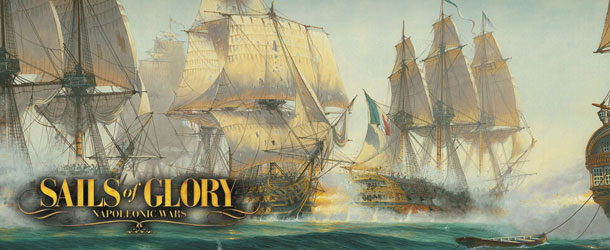
I haven't reviewed many board games. I like to play board games, and there's quite a few that I'd like to review. Sadly, it's been difficult to organize regular board game meetings over the past few years due to the ever-changing work schedules of my social circle and other adult responsibilities. Stupid jobs and chores, always getting in the way of the stuff I want to do! Most of the board games that I play only get played once or twice (and sessions are often months or years apart), which is certainly not enough play-time to justify writing a review, since it's barely enough time to get a really good feel for how the mechanics and strategies of the game work.
But one game that really piqued my interest was Sails of Glory: Napoleonic Wars, a game about naval combat in the age of sail. It is made by Ares Games, the same company that created the WWI and WWII dogfighting game Wings of Glory. If you've ever played the more popular Fantasy Flight games Star Wars: X-Wing or its sister game Star Wars: Armada (both being games that I'd like to review), then you should feel pretty comfortable with Sails of Glory. X-Wing was based off of Ares' Wings of Glory game, and both Armada and Sails of Glory use similar mechanics and rules. Sails of Glory certainly shares more in common with Armada though, since both games involve slow-paced battles between large capital ships, rather than the faster dogfighting mechanics of their predecessors. And both Sails of Glory and Armada simulate the lumbering nature of their respective ships with mechanics that require players to pre-plan their movements ahead of time, which adds a whole new element of strategy and challenge.
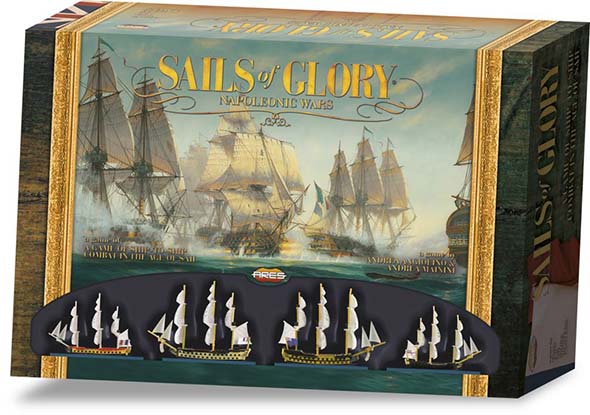
Sails of Glory includes 4 pre-assembled French and British ship miniatures.
Sails of Glory isn't a traditional board game, in that it doesn't include an actual board to play on. Instead, the game requires the players to move their ship miniatures across a playing surface (the size of which is determined by the specific scenario being played) by using a deck of maneuver cards. Movement isn't restrained to a grid of squares or hexes, so lots of careful measurement and manipulation of the models is necessary. Players must maneuver their ships in order to get the enemy ships into the firing arc of their cannons in order to attack, and the winner of the game is usually the one who destroys all the enemy ships; though, some scenarios have other winning conditions.
Another key difference between X-Wing / Armada versus Sails of Glory is that all of Sails of Glory's actions are treated as simultaneous. This helps to keep the game flowing a bit more quickly by allowing the player to move their ships and determine combat damage at the same time, rather than having to take turns moving one ship at a time. It also alters the strategy a little bit by permitting "mutual destruction". Since all ships are considered to fire at the same time, there is the possibility that ships may destroy each other in the same turn. It is only in the case of collisions (or possible collisions) that the game requires ships to be moved in a specific order.
[More]
47c75ecc-1a9c-47a2-b9c1-61d80f93ff1b|0|.0
Tags:Sails of Glory, Sails of Glory: Napoleonic Wars, board game, miniatures game, Ares Games, sailing, age of sail, ship of the line, frigate, wind, maneuver, cannon, line of sight, weapon arc, chit, Andrea Angiolino, Andrea Mainini